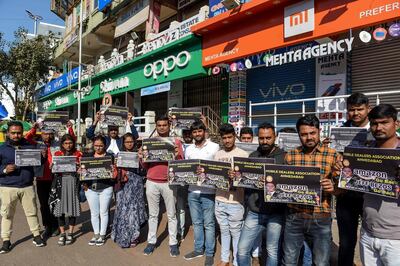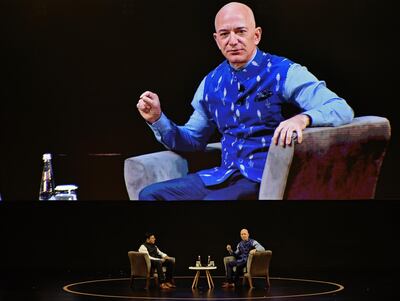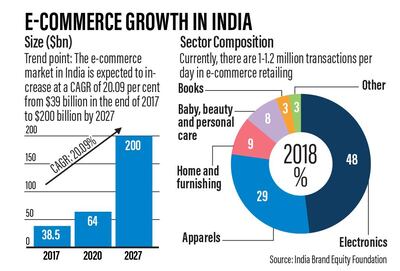Mobile phone shop owner Gaurav Jain worries that discounts offered by online retailers in India will push his Central Mumbai store out of business.
“People come into my shop and they look at the phones and ask questions, but then they go and buy them online because they're cheaper,” he says.
With widespread concerns among shopkeepers in India about the impact of US online giant Amazon and Walmart-owned Flipkart on their business, Mr Jain is not alone.
These business practices have unnerved traditional players who are at a disadvantage and the government has to listen to these players because of the nature of the Indian economy ...
As a result, e-commerce companies are not having an easy time. Following complaints from small traders, the country's antitrust watchdog, the Competition Commission of India, began its probe earlier this week into whether Amazon and Flipkart are violating competition law.
The move came ahead of Amazon chief Jeff Bezos' three-day visit to India, which began on Wednesday, where the billionaire was greeted with protests against the company from small business owners.
Analysts say the issue has been brewing for some time and has now reached boiling point as the e-commerce sector rapidly expands in India and the regulatory environment governing the sector continues to evolve.
“If you look at some of the developments in the last couple of years in the e-commerce sector, there has been a gradual build up towards this,” says Ravisekhar Nair, a partner at Economic Laws Practice who co-heads the Mumbai firm's competition law and policy practice. “There has been a high-pitched advocacy on issues surrounding e-commerce, particularly its impact on MSME (micro, small and medium enterprises).”
India's e-commerce industry is expanding 30 per cent year-on-year, in terms of gross merchandise value, and is estimated to reach $200 billion (Dh734.64bn) by 2027, according to investment bank Morgan Stanley. This is propelled by rising middle class incomes and growing smartphone ownership in the country, which is bringing more consumers online in a country with more than 1.3 billion people.
The opportunity has encouraged Amazon to invest heavily in India, while in 2018 US retail firm Walmart snapped up a majority stake in Flipkart, the country's homegrown rival to Amazon, for $16bn.
The sector's expansion means that the impact on small traders' businesses has only increased.
“Now since the space has reached a critical mass and developments in this space impact millions of stakeholders directly, it is obvious there would be much more scrutiny at each and every step,” says Rahul Agarwal, the director at Wealth Discovery, a financial services firm based in New Delhi.
“These business practices have unnerved traditional players who are at a disadvantage and the government has to listen to these players because of the nature of the Indian economy, where these small business are responsible for creating a large number of jobs and employment for millions of ordinary Indian citizens.”
The CCI probe is examining allegations that Amazon and Flipkart are offering heavy discounts and exclusive mobile phone launches and sticking to preferred sellers.
This follows new rules, introduced for foreign-owned e-commerce firms last February. Under the foreign direct investment policy, India banned e-commerce firms, including Amazon and Flipkart, from selling products from companies in which they own equity and placed restrictions on discounting and exclusive tie-ups with brands.
Amazon denies its practices are falling foul of the law.
"We welcome the opportunity to address allegations made about Amazon,” Amazon India said in a statement. “We are confident in our compliance, and will co-operate fully with [the competition commission].”
Flipkart also denies any wrongdoing.
“The Flipkart group is fully compliant with all applicable laws and FDI regulations,” Flipkart says. “We take pride in democratising e-commerce in India and giving market access to hundreds of thousands of MSMEs, sellers, artisans and small businesses, making quality and affordable goods available to consumers through our transparent and efficient marketplace while creating lakhs of jobs.”
Small businesses, however, accuse the two major foreign-owned entities of flouting these rules.
“They are engaging in predatory pricing and deep discounting, which is totally prohibited; this has adversely affected the business of millions of traders in India,” says Praveen Khandelwal, the secretary general of the Confederation of All India Traders (CAIT), a lobby group representing traders. “Tens of thousands of shops have been forced to shut down because of e-commerce portals.”
CAIT was behind the organised protests across the country that coincided with Mr Bezos' visit to India, where protesters carried banners with slogans such as “Jeff Bezos Go Back” and “Amazon Go Back”.
The lobby group has demanded the government rolls out an e-commerce policy as soon as possible, as well as setting up a regulatory authority to regulate and monitor the sector, with regulators indicating an e-commerce policy will come later this year.
When Mr Bezos visited India amid the protests, he took the opportunity to fend off criticism by stressing the contribution Amazon is making to the country's economy.
He unveiled plans to create 1 million new jobs in India - directly and indirectly - by 2025 through continued investments in technology, infrastructure and logistics. The tech mogul also said that the company plans to invest $1bn to help bring 10 million traders and micro, small, and medium-sized businesses in India online.
But India's commerce and industry minister Piyush Goyal was quick to point out that Amazon is losing money in India and there were questions over whether unfair trade practices are a factor in this.
"They may have put in a billion dollars, but if they make a loss of a billion dollars every year, then they will jolly well have to finance that billion dollars," said Mr Goyal. "So, it is not as if they are doing a favour to India when they invest a billion dollars."
Rakesh Mohan Joshi, professor and chairperson at the Indian Institute of Foreign Trade, says the CCI probe suggests a move towards a crackdown on unfair practices.
“The current investigations into the alleged unfair practices of mega-online platforms have exposed not only the loopholes in the e-commerce practices but also revealed that such practices would not go unnoticed,” says Mr Joshi. “However, the law enforcing authorities need to be cautious and not create any unnecessary hurdles.”
He adds that “online platforms need to adopt self-regulatory measures and adhere to ethical practices and at the same time the government should establish a robust regulatory framework to curb unfair practices".
This all comes as competition within the e-commerce sector is also on the rise. Reliance Industries, the oil-focused conglomerate owned by India's richest man, Mukesh Ambani, is taking on the likes of Amazon and Flipkart with its own online shopping platform JioMart, which recently started operations in limited areas as part of a soft launch. As an Indian-owned company, JioMart would not be subject to the same FDI restrictions applied to Amazon and Walmart-owned Flipkart.
As the e-commerce sector continues to grow, experts say clear regulation of the industry is extremely important.
“A country’s regulatory and policy environment plays an important role in its economic growth,” says Mr Agarwal. “While any rigid policy can hinder the economy, it is important to have a proper regulatory [framework] in place that can protect … businesses from any unhealthy competition.”
He notes, though, that “it is extremely difficult to take sides in this issue because although the traders and business have been at the receiving end … the intense competition between these two players has been a boon to millions of customers who have ultimately benefited through lower prices, ease of buying and expansion in available product choices”.
But tensions caused by the growth of e-commerce are not expected to be resolved quickly.
"It will take a fair while before the regulatory scrutiny of the e-commerce sector settles," says Mr Nair. "Until such time, we are likely to witness more debates among the stakeholders and perhaps more frequent interventions by various regulators."
More from Neighbourhood Watch:
Killing of Qassem Suleimani
More from Neighbourhood Watch:
The National's picks
4.35pm: Tilal Al Khalediah
5.10pm: Continous
5.45pm: Raging Torrent
6.20pm: West Acre
7pm: Flood Zone
7.40pm: Straight No Chaser
8.15pm: Romantic Warrior
8.50pm: Calandogan
9.30pm: Forever Young
Dhadak 2
Director: Shazia Iqbal
Starring: Siddhant Chaturvedi, Triptii Dimri
Rating: 1/5
EA Sports FC 25
Developer: EA Vancouver, EA Romania
Publisher: EA Sports
Consoles: Nintendo Switch, PlayStation 4&5, Xbox One and Xbox Series X/S
Rating: 3.5/5
The five new places of worship
Church of South Indian Parish
St Andrew's Church Mussaffah branch
St Andrew's Church Al Ain branch
St John's Baptist Church, Ruwais
Church of the Virgin Mary and St Paul the Apostle, Ruwais
What is a Ponzi scheme?
A fraudulent investment operation where the scammer provides fake reports and generates returns for old investors through money paid by new investors, rather than through ligitimate business activities.
GROUP RESULTS
Group A
Results
Ireland beat UAE by 226 runs
West Indies beat Netherlands by 54 runs
Group B
Results
Zimbabwe tied with Scotland
Nepal beat Hong Kong by five wickets
THREE
%3Cp%3EDirector%3A%20Nayla%20Al%20Khaja%3C%2Fp%3E%0A%3Cp%3EStarring%3A%20Jefferson%20Hall%2C%20Faten%20Ahmed%2C%20Noura%20Alabed%2C%20Saud%20Alzarooni%3C%2Fp%3E%0A%3Cp%3ERating%3A%203.5%2F5%3C%2Fp%3E%0A
Start-up hopes to end Japan's love affair with cash
Across most of Asia, people pay for taxi rides, restaurant meals and merchandise with smartphone-readable barcodes — except in Japan, where cash still rules. Now, as the country’s biggest web companies race to dominate the payments market, one Tokyo-based startup says it has a fighting chance to win with its QR app.
Origami had a head start when it introduced a QR-code payment service in late 2015 and has since signed up fast-food chain KFC, Tokyo’s largest cab company Nihon Kotsu and convenience store operator Lawson. The company raised $66 million in September to expand nationwide and plans to more than double its staff of about 100 employees, says founder Yoshiki Yasui.
Origami is betting that stores, which until now relied on direct mail and email newsletters, will pay for the ability to reach customers on their smartphones. For example, a hair salon using Origami’s payment app would be able to send a message to past customers with a coupon for their next haircut.
Quick Response codes, the dotted squares that can be read by smartphone cameras, were invented in the 1990s by a unit of Toyota Motor to track automotive parts. But when the Japanese pioneered digital payments almost two decades ago with contactless cards for train fares, they chose the so-called near-field communications technology. The high cost of rolling out NFC payments, convenient ATMs and a culture where lost wallets are often returned have all been cited as reasons why cash remains king in the archipelago. In China, however, QR codes dominate.
Cashless payments, which includes credit cards, accounted for just 20 per cent of total consumer spending in Japan during 2016, compared with 60 per cent in China and 89 per cent in South Korea, according to a report by the Bank of Japan.
The specs
Price, base: Dh228,000 / Dh232,000 (est)
Engine: 5.7-litre Hemi V8
Transmission: Eight-speed automatic
Power: 395hp @ 5,600rpm
Torque: 552Nm
Fuel economy, combined: 12.5L / 100km
How to donate
Send “thenational” to the following numbers or call the hotline on: 0502955999
2289 – Dh10
2252 – Dh 50
6025 – Dh20
6027 – Dh 100
6026 – Dh 200
The specs
Engine: 4.0-litre V8 twin-turbocharged and three electric motors
Power: Combined output 920hp
Torque: 730Nm at 4,000-7,000rpm
Transmission: 8-speed dual-clutch automatic
Fuel consumption: 11.2L/100km
On sale: Now, deliveries expected later in 2025
Price: expected to start at Dh1,432,000
RACE CARD
5pm: Handicap (PA) Dh70,000 1,400m
5.30pm: Handicap (TB) Dh70,000 1,000m
6pm: Maiden (PA) Dh70,000 2,000m
6.30pm: Handicap (PA) Dh70,000 2,000m
7pm: Maiden (PA) Dh70,000 1,600m
7.30pm: Al Ain Mile Group 3 (PA) Dh350,000 1,600m
8pm: Handicap (PA) Dh70,000 1,600m
Amith's selections:
5pm: AF Sail
5.30pm: Dahawi
6pm: Taajer
6.30pm: Pharitz Oubai
7pm: Winked
7.30pm: Shahm
8pm: Raniah
The%20end%20of%20Summer
%3Cp%3EAuthor%3A%20Salha%20Al%20Busaidy%3C%2Fp%3E%0A%3Cp%3EPages%3A%20316%3C%2Fp%3E%0A%3Cp%3EPublisher%3A%20The%20Dreamwork%20Collective%C2%A0%3C%2Fp%3E%0A
Sholto Byrnes on Myanmar politics
UAE SQUAD
Goalkeepers: Ali Khaseif, Fahad Al Dhanhani, Mohammed Al Shamsi, Adel Al Hosani
Defenders: Bandar Al Ahbabi, Shaheen Abdulrahman, Walid Abbas, Mahmoud Khamis, Mohammed Barghash, Khalifa Al Hammadi, Hassan Al Mahrami, Yousef Jaber, Salem Rashid, Mohammed Al Attas, Alhassan Saleh
Midfielders: Ali Salmeen, Abdullah Ramadan, Abdullah Al Naqbi, Majed Hassan, Yahya Nader, Ahmed Barman, Abdullah Hamad, Khalfan Mubarak, Khalil Al Hammadi, Tahnoun Al Zaabi, Harib Abdallah, Mohammed Jumah, Yahya Al Ghassani
Forwards: Fabio De Lima, Caio Canedo, Ali Saleh, Ali Mabkhout, Sebastian Tagliabue, Zayed Al Ameri
More coverage from the Future Forum
Benefits of first-time home buyers' scheme
- Priority access to new homes from participating developers
- Discounts on sales price of off-plan units
- Flexible payment plans from developers
- Mortgages with better interest rates, faster approval times and reduced fees
- DLD registration fee can be paid through banks or credit cards at zero interest rates
COMPANY%20PROFILE%20
%3Cp%3E%3Cstrong%3EName%3A%3C%2Fstrong%3E%20Haltia.ai%0D%3Cbr%3E%3Cstrong%3EStarted%3A%3C%2Fstrong%3E%202023%0D%3Cbr%3E%3Cstrong%3ECo-founders%3A%3C%2Fstrong%3E%20Arto%20Bendiken%20and%20Talal%20Thabet%0D%3Cbr%3E%3Cstrong%3EBased%3A%3C%2Fstrong%3E%20Dubai%2C%20UAE%0D%3Cbr%3E%3Cstrong%3EIndustry%3A%3C%2Fstrong%3E%20AI%0D%3Cbr%3E%3Cstrong%3ENumber%20of%20employees%3A%3C%2Fstrong%3E%2041%0D%3Cbr%3E%3Cstrong%3EFunding%3A%3C%2Fstrong%3E%20About%20%241.7%20million%0D%3Cbr%3E%3Cstrong%3EInvestors%3A%3C%2Fstrong%3E%20Self%2C%20family%20and%20friends%26nbsp%3B%3C%2Fp%3E%0A
10 tips for entry-level job seekers
- Have an up-to-date, professional LinkedIn profile. If you don’t have a LinkedIn account, set one up today. Avoid poor-quality profile pictures with distracting backgrounds. Include a professional summary and begin to grow your network.
- Keep track of the job trends in your sector through the news. Apply for job alerts at your dream organisations and the types of jobs you want – LinkedIn uses AI to share similar relevant jobs based on your selections.
- Double check that you’ve highlighted relevant skills on your resume and LinkedIn profile.
- For most entry-level jobs, your resume will first be filtered by an applicant tracking system for keywords. Look closely at the description of the job you are applying for and mirror the language as much as possible (while being honest and accurate about your skills and experience).
- Keep your CV professional and in a simple format – make sure you tailor your cover letter and application to the company and role.
- Go online and look for details on job specifications for your target position. Make a list of skills required and set yourself some learning goals to tick off all the necessary skills one by one.
- Don’t be afraid to reach outside your immediate friends and family to other acquaintances and let them know you are looking for new opportunities.
- Make sure you’ve set your LinkedIn profile to signal that you are “open to opportunities”. Also be sure to use LinkedIn to search for people who are still actively hiring by searching for those that have the headline “I’m hiring” or “We’re hiring” in their profile.
- Prepare for online interviews using mock interview tools. Even before landing interviews, it can be useful to start practising.
- Be professional and patient. Always be professional with whoever you are interacting with throughout your search process, this will be remembered. You need to be patient, dedicated and not give up on your search. Candidates need to make sure they are following up appropriately for roles they have applied.
Arda Atalay, head of Mena private sector at LinkedIn Talent Solutions, Rudy Bier, managing partner of Kinetic Business Solutions and Ben Kinerman Daltrey, co-founder of KinFitz





